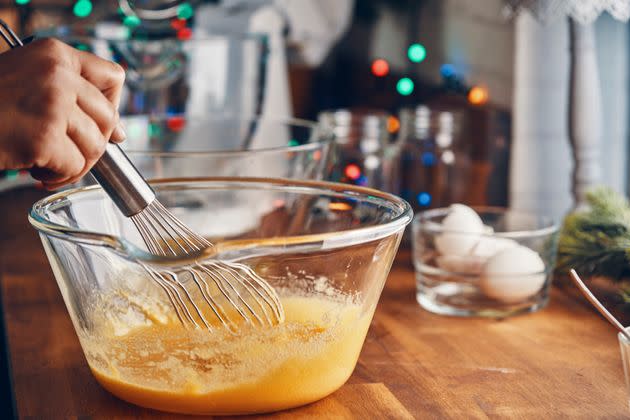Homemade is usually better, but not necessarily in the case of eggnog.
It’s the holidays, so break out the eggnog. It’s festive, luscious, creamy, sweet, sometimes spiked ... and possibly teeming with pathogens.
“Raw eggs are the biggest risk because you have a danger of getting salmonella,” said Bill Marler, a food safety litigator (you might recognize him from the documentary, “Poisoned: The Dirty Truth About Your Food”).
Salmonella is an equal opportunity bacteria. A recent outbreak was traced to pet turtles, but most salmonella infections stem from food. The bacteria causes about 1.35 million infections annually. Best-case scenario, you’ll feel rotten for a day or two, but salmonella accounts for 26,000 hospitalizations and over 400 fatalities a year,according to the CDC.
For Dr. Don Schaffner, a Rutgers distinguished professor and extension specialist in Food Science, the worry is not so much about the eggs and more about eggnog’s milk and cream. “The risks from raw dairy are more well established,” he said. Those risks include salmonella but also listeria, e.coli and campylobacter.
All of this could make you wonder how eggnog got to be a thing, anyway. According to many food historians, eggnog’s origins date back to 17th century England. Only the wealthy had access to eggs, milk and booze, so they’d mix it all together and flaunt it at the holidays.
If you’re determined to brave the bacteria and suck down that Christmas cup of calories (an 8-ounce serving averages around 250 to 300 calories), Dr. Mildred Cody, a registered dietician nutritionist (RDN) and food safety instructor emerita at Georgia State University, explains ways you can do it safely. “Don’t count on alcohol in eggnog to kill all of the bacteria,” Cody said. “That’s not likely to happen.” The answer, she says, is pasteurization.
Store-bought eggnog is the safer choice.
Remember Louis Pasteur from grade school science class? He’s the guy behind pasteurization, a process of zapping perishables like eggs and dairy at high heat just long enough to kill any wayward pathogens without affecting the quality of the food. But here’s the thing: “Most eggs in [an American] grocery store are not pasteurized,” said Elisa Maloberti, the American Egg Board’s manager of food safety. “Pasteurized eggs will be clearly marked on the package.”
“The most recent estimates indicate that about three out of every 10,000 eggs is positive for salmonella,” Schaffner said. “This means the risk from any individual egg is low, but of course the more eggs you combine, the higher the risk.”
Pasteurization is one of the keys to avoiding salmonella poisoning from eggnog.
It’s still a risk. England experienced an egg-related salmonella outbreakback in March. One way or another,48 million people each year hit the foodborne illness jackpot. You may not want to play those odds.
While both Cody and Maloberti say it’s possible to pasteurize raw eggs at home using a sensitive digital thermometer, take your eye off the process and you’ll likely wind up with scrambled eggs.
“Packaged prepared eggnog is much safer,” Schaffner said. “The pasteurization process is done by a food manufacturing facility that understands how to best process foods to ensure that they are safe.”
So you open your carton of nog with its pasteurized eggs and pasteurized milk and cream, whip it into a fabulous froth, add booze, and boom, good to go, right?
Well, no. “All pasteurized foods, including egg products, can support bacteria growth if subjected to cross contamination,” Maloberti said. “For example, if sharing utensils from other raw or cooked foods.”
Marler agrees. “A punchbowl of eggnog has the same risk profile that a salad bar might have. You’re sharing the utensils and bowl with a lot of people. You may not know the risks you run.” He isn’t trying to be a downer. He’s just concerned about your health, and the health of your holiday party host. And all the guests. “You hope people are not infectious and are using good hygiene.”
Marler’s talking norovirus, aka the cruise flu, the super contagious superbug which actually hits more people than salmonella and hepatitis. It’s the viral foodborne illness grand champion, according to the CDC and World Health Organization.
Close behind norovirus in terms of contagion risk is hepatitis, which is carried by um, fecal matter. “It can get on utensils, on you,” Marler said. Food spoilage can usually be detected by an off smell — something funky, sour or rotten. Viruses and bacteria, not so much. You won’t even realize you’ve been infected until you feel like roadkill a few days later.
Life and eggnog offer no guarantees, but the experts recommend these tips to minimize risk of nasty nog:
Keep food — and drinks! — at 40 degrees Fahrenheit or cooler to prevent pesky pathogens.
Don’t leave perishables out at room temperature for longer than two hours.
Keep hot foods hot, and keep them separate from cool items.
Wash your kitchen tools.
Wash your hands.
Come party time, rather than serving eggnog in a pretty punchbowl brimming with pathogens, ladle it up a cup at a time, keeping the rest refrigerated. It might take a few extra minutes away from your holiday party, but it will prevent you and your guests from a trip to urgent care.

